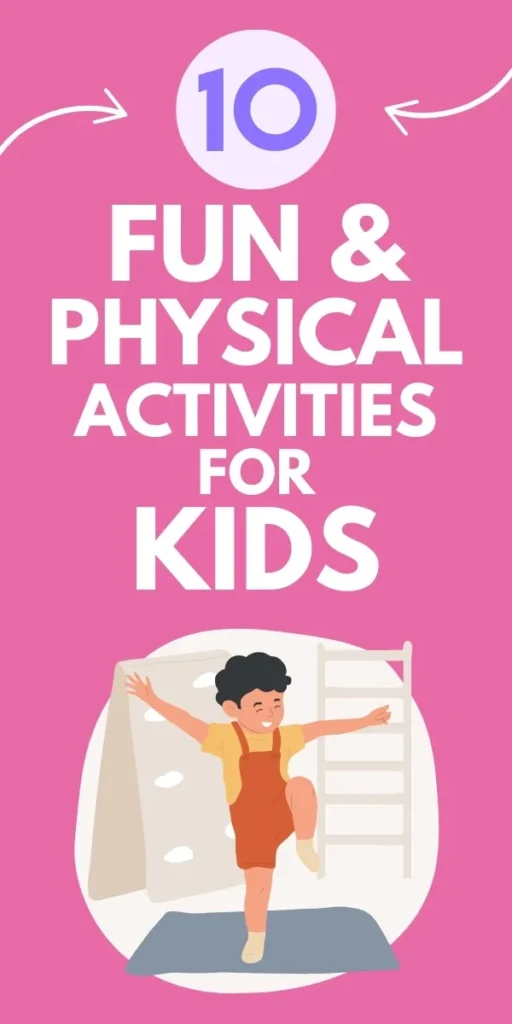Keeping your little one active isn’t just about tiring them out before bedtime (although a good night’s sleep is a welcome bonus!). Physical activity is crucial for a preschooler or toddler’s development. It strengthens their growing bodies, improves coordination, and even boosts brain function.
But how do you get your energetic little mover engaged without resorting to mindless TV time? The answer is simple: play!
By incorporating fun and engaging physical activities into your day, you’re setting your child up for a lifetime of healthy habits and a love for movement.
Fun Physical Activities For Preschoolers
Keeping up with energetic preschoolers can be a challenge! These 10 fun and easy physical activities use common household items and get your little ones moving. They help develop important gross motor skills, coordination, and balance.
Activity 1: Animal Walk
Age Group: 3-5 years old
Materials: None needed!
How to Perform: Get ready for a wild animal walk! Choose different animals and imitate their movements. Waddle like a duck, hop like a bunny, or sneak like a cat. This activity strengthens gross motor skills, coordination, and imagination.
Area of Development: Gross motor skills, Coordination, Imagination
Activity 2: Tunnel Time

Age Group: 3-5 years old
Materials: Blankets, pillows, chairs
How to Perform: Build a cozy tunnel for some crawling fun! Drape blankets over chairs or use pillows to create a tunnel. Encourage your child to crawl through the tunnel on their hands and knees or pretend they’re a train chugging through a tunnel. This activity strengthens gross motor skills, coordination, and spatial awareness.
Area of Development: Gross motor skills, Coordination, Spatial awareness
Activity 3: Simon Says
Age Group: 3-5 years old
Materials: None needed!
How to Perform: A classic game with a twist! Take turns being “Simon” and give instructions like “Simon says jump high!” or “Simon says touch your toes!” Follow the instructions when you say “Simon says” but don’t move if you don’t hear “Simon says.” This activity strengthens gross motor skills, following directions, and listening skills.
Area of Development: Gross motor skills, Following directions, Listening skills
Activity 4: Hopping Hearts
Age Group: 3-5 years old
Materials: None needed!
How to Perform: Get those hearts pumping with some jumping fun! Play jumping games together. Hop on one foot, jump with two feet together, or see how high you can jump and touch your toes. This activity strengthens gross motor skills, coordination, and cardiovascular health.
Area of Development: Gross motor skills, Coordination, Cardiovascular health
Activity 5: Dance Party Parade

Age Group: 3-5 years old
Materials: Music (optional)
How to Perform: Turn up the music and have a dance party parade! Put on some music or sing songs together. March around the room, wiggle your hips, or spin in circles. This activity strengthens gross motor skills, coordination, and following music (if using music).
Area of Development: Gross motor skills, Coordination, Following music
Activity 6: Obstacle Course Challenge

Age Group: 3-5 years old
Materials: Pillows, blankets, chairs, toys (optional)
How to Perform: Create an obstacle course for a fun challenge! Use pillows, blankets, and chairs to create tunnels, mazes, and jumping hurdles. Add toys as stepping stones or targets to throw beanbags at. Time yourselves as you complete the obstacle course and see if you can beat your best time. This activity strengthens gross motor skills, coordination, and problem-solving skills.
Area of Development: Gross motor skills, Coordination, Problem-solving skills
Activity 7: Freeze Dance Fun
Age Group: 3-5 years old Materials: Music
How to Perform: Get ready to move and freeze! Put on some music and dance around the room. When the music stops, everyone must freeze in place like a statue. Play again with different types of music and encourage silly frozen poses. This activity strengthens gross motor skills, coordination, and following directions.
Area of Development: Gross motor skills, Coordination, Following directions
Activity 8: Balloon Bop
Age Group: 3-5 years old
Materials: Balloons (inflated)
How to Perform: Keep those balloons bouncing! Blow up some balloons and have a friendly game of keeping them in the air. Use different parts of your body to hit the balloons up (hands, forearms, head). See how long you can keep the balloons from touching the ground. This activity strengthens gross motor skills, hand-eye coordination, and reflexes.
Area of Development: Gross motor skills, Hand-eye coordination, Reflexes
Activity 9: Scavenger Hunt Steps
Age Group: 3-5 years old Materials: List of hidden objects (written or pictures), small prize (optional)
How to Perform: Combine learning with movement with a scavenger hunt! Hide small objects around the house and create a list with words or pictures for your child to find. Let them walk, hop, or skip from place to place to find the hidden objects. This activity strengthens gross motor skills, following directions, and problem-solving skills.
Area of Development: Gross motor skills, Following directions, Problem-solving skills
Activity 10: Yoga Fun

Age Group: 3-5 years old
Materials: Yoga mat (optional)
How to Perform: Introduce yoga poses in a fun way! Find a comfortable spot on the floor (yoga mat if you have one). Show your child simple yoga poses like downward-facing dog (puppy pose!), mountain pose (standing tall!), or tree pose (balancing on one leg). Yoga is a great way to develop balance, coordination, and body awareness.
Area of Development: Balance, Coordination, Body awareness

Conclusion
The key to keeping your preschooler or toddler active is to make it fun! Don’t force structured workouts or drills. Instead, use these activities as a springboard for imaginative play and exploration.
Let their curiosity guide them, and you’ll be amazed at how much they learn and develop through their movement. Remember, you’re their playmate – get down on the floor, join in the games, and create a world of active fun together!